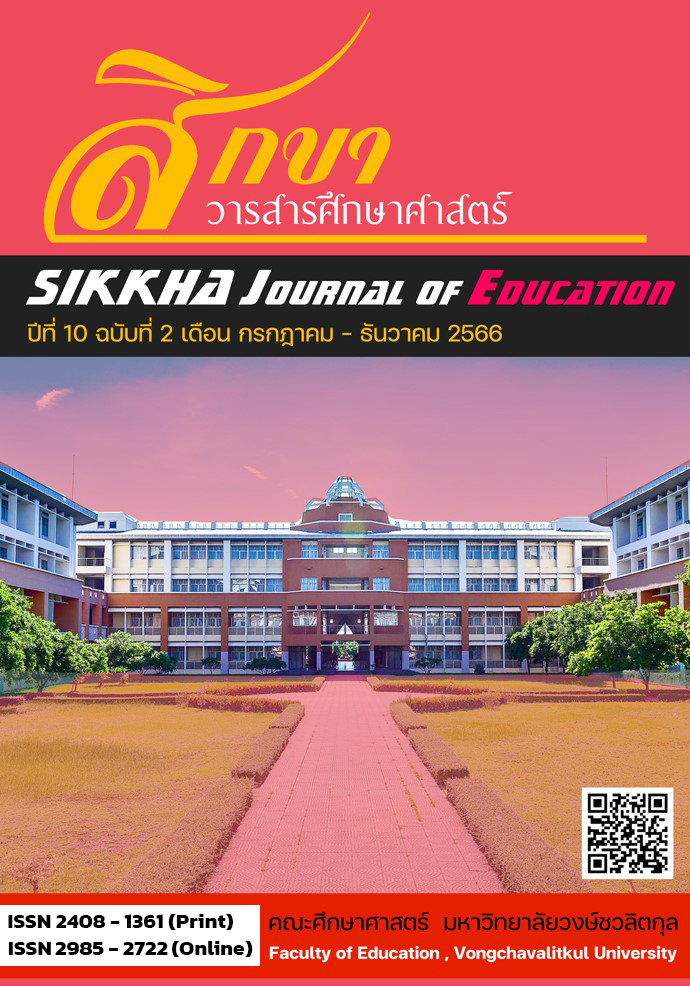การพัฒนาองค์ประกอบและตัวบ่งชี้ภาวะผู้นำเชิงจริยธรรมของผู้บริหารสถานศึกษา สังกัดสำนักงานเขตพื้นที่การศึกษามัธยมศึกษาในภาคตะวันออกเฉียงเหนือตอนล่าง 1
คำสำคัญ:
องค์ประกอบ, ตัวบ่งชี้, ภาวะผู้นำเชิงจริยธรรมบทคัดย่อ
การวิจัยครั้งนี้มีวัตถุประสงค์ 1) เพื่อพัฒนาองค์ประกอบและตัวบ่งชี้ภาวะผู้นำเชิงจริยธรรมของผู้บริหารสถานศึกษา และ 2) เพื่อวิเคราะห์ความสอดคล้องขององค์ประกอบและตัวบ่งชี้ภาวะผู้นำเชิงจริยธรรมของผู้บริหารสถานศึกษา สังกัดสำนักงานเขตพื้นที่การศึกษามัธยมศึกษาในภาคตะวันออกเฉียงเหนือตอนล่าง 1 กับข้อมูลเชิงประจักษ์ กลุ่มตัวอย่างที่ใช้ในการวิจัย คือ ผู้บริหารสถานศึกษา รองผู้บริหารสถานศึกษา และครู สังกัดสำนักงานเขตพื้นที่การศึกษามัธยมศึกษานครราชสีมา ในภาคตะวันออกเฉียงเหนือตอนล่าง 1 จำนวน 570 คน ซึ่งได้มาโดยการสุ่มตัวอย่างแบบแบ่งเป็นชั้นภูมิ แบบไม่เป็นสัดส่วนกับขนาดของกลุ่ม เครื่องมือที่ใช้ในการวิจัย คือ แบบสัมภาษณ์แบบมีโครงสร้าง แบบประเมินความเหมาะสมขององค์ประกอบและตัวบ่งชี้และแบบสอบถามเพื่อการวิจัย สถิติที่ใช้ในการวิจัย คือ ค่าเฉลี่ย ค่าเบี่ยงเบนมาตรฐาน ค่าสัมประสิทธิ์สหสัมพันธ์แบบเพียร์สันและการวิเคราะห์องค์ประกอบเชิงยืนยัน (Confirmatory Factor Analysis : CFA)
ผลการวิจัย พบว่า 1) องค์ประกอบและตัวบ่งชี้ภาวะผู้นำเชิงจริยธรรมของผู้บริหารสถานศึกษามี 8 องค์ประกอบ 63 ตัวบ่งชี้ และมีผลการประเมินความเหมาะสมขององค์ประกอบและตัวบ่งชี้โดยภาพรวมมีความเหมาะสมอยู่ในระดับมากที่สุด (=4.61,S.D.=1.88) ด้านการให้ความเคารพผู้อื่น มีความเหมาะสมอยู่ในระดับมากที่สุดเป็นลำดับแรก (
=4.66,S.D.=2.02) รองลงมาได้แก่ ด้านการให้บริการผู้อื่นมีความเหมาะสมอยู่ในระดับมากที่สุด (
=4.64,S.D.=1.93) และด้านการมีวิสัยทัศน์ มีความเหมาะสมอยู่ในระดับมากที่สุด (
=4.55,S.D.=1.82) เป็นลำดับสุดท้าย และ2) การวิเคราะห์ความสอดคล้องขององค์ประกอบและตัวบ่งชี้ภาวะผู้นำเชิงจริยธรรมของผู้บริหารสถานศึกษากับข้อมูลเชิงประจักษ์ มีผลการวิเคราะห์ความสัมพันธ์ระหว่างตัวแปรสังเกตได้มีค่าสัมประสิทธิ์สหสัมพันธ์แบบเพียร์สันระหว่าง -0.003 ถึง 0.884มีค่าแตกต่างจากศูนย์อย่างมีนัยสำคัญทางสถิติที่ระดับ 0.01 และโมเดลการวัดภาวะผู้นำเชิงจริยธรรมมีความสอดคล้องกับข้อมูลเชิงประจักษ์ โดยพิจารณาจาก ค่า
= 803.610, df = 218, p-value = 0.00, CFI =0.94, GFI = 0.90, RMR = 0.02, RMSEA = 0.07
เอกสารอ้างอิง
กนกพร รัตนะอุดม และอำนวย ทองโปร่ง. (2565). ความคิดเห็นของครูเกี่ยวกับคุณลักษณะของผู้บริหารสถานศึกษาในโรงเรียนสังกัดสหวิทยาเขตเสรีไทย สำนักงานเขตพื้นที่การศึกษามัธยมศึกษา เขต 2. สิกขา วารสารศึกษาศาสตร์, 9(1), 13-24.
กนกอร สมปราชญ์. (2555). ภาวะผู้นำ : แนวคิด ทฤษฎีและการพัฒนา. ขอนแก่น: ภาควิชาการบริหารการศึกษา คณะศึกษาศาสตร์ มหาวิทยาลัยขอนแก่น.
ข้อบังคับคุรุสภาว่าด้วยจรรยาบรรณของวิชาชีพ พ.ศ.2556. (2556, 19 กันยายน). ราชกิจจานุเบกษา. (เล่มที่ 130 ตอนพิเศษ 130 ง. น.72-74).
จำเริญรัตน์ จิตต์จิรจรรย์. (2559). ภาวะผู้นำการให้บริการสำหรับผู้ประกอบวิชาชีพทางการศึกษา. วารสารวิชาการสมาคม สถาบันอุดมศึกษาเอกชนแห่งประเทศไทย, 22(1), 141-154.
จำเริญรัตน์ จิตต์จิรจรรย์. (2561). ขอบฟ้าใหม่ของภาวะผู้นำเชิงจริยธรรม สำหรับผู้บริหารการศึกษามืออาชีพ : มิติทางจริยศาสตร์. นครราชสีมา: สมบูรณ์การพิมพ์.
นงลักษณ์ วิรัชชัย. (2542). โมเดลลิสเรล : สถิติสำหรับการวิจัย. กรุงเทพฯ: โรงพิมพ์แห่งจุฬาลงกรณ์มหาวิทยาลัย.
นรา สมประสงค์. (2561). หน่วยที่ 14 ภาวะผู้นำเชิงจริยธรรม, ใน ประมวลสาระชุดวิชานวัตกรรมการบริหารการศึกษาและภาวะผู้นำ. นนทบุรี: มหาวิทยาลัยสุโขทัยธรรมาธิราช.
เนชั่น. (2565). แฉพฤติกรรม “ผอ.โรงเรียน”ใช้ครูเยี่ยง “ทาส” สั่งให้อาหารสุนัข-ซักเสื้อผ้า. สืบค้นจาก https://www.nationtv.tv/news/378864010
ประชุม โพธิกุล. (2550). ความกล้าทางจริยธรรมของผู้นำทางการศึกษา. กรุงเทพฯ: สถาบันพัฒนาผู้บริหารการศึกษา กระทรวงศึกษาธิการ.
พระพรหมคุณาภรณ์ (ประยุทธ์ ปยุตฺโต). (2551). พจนานุกรมพุทธศาสน์ ฉบับประมวลศัพท์ (พิมพ์ครั้งที่ 11). กรุงเทพฯ: เอส.อาร์.พริ้นติ้ง แมส โปรดักส์.
พระราชบัญญัติมาตรฐานทางจริยธรรม พ.ศ. 2562. (2562, 16 เมษายน). ราชกิจจานุเบกษา. (เล่มที่ 136 ตอนที่ 50 ก. น.2).
พระเมธีธรรมาภรณ์ (ประยูร ธมฺมจิตฺโต). (2553). คุณธรรมสำหรับนักบริหาร. กรุงเทพฯ: คณะศึกษาศาสตร์ มหาวิทยาลัยศรีนครินทรวิโรฒ.
รัฐธรรมนูญแห่งราชอาณาจักรไทย พุทธศักราช 2560. (2560, 6 เมษายน). ราชกิจจานุเบกษา. (เล่มที่ 134 ตอนที่ 40 ก. น.20).
รัตติกรณ์ จงวิศาล. (2559). ภาวะผู้นำ : ทฤษฎี การวิจัย และแนวทางสู่การพัฒนา (พิมพ์ครั้งที่ 3). กรุงเทพฯ: สำนักพิมพ์แห่งจุฬาลงกรณ์มหาวิทยาลัย.
รัษฎากร ประสาท และสถิรพร เชาวน์ชัย. (2566) ความต้องการจำเป็นและแนวทางการพัฒนาภาวะผู้นำทางวิชาการของหัวหน้าฝ่ายวิชาการในโรงเรียนประถมศึกษา สังกัดสำนักงานเขตพื้นที่การศึกษาประถมศึกษานครสวรรค์ เขต 3. สิกขา วารสารศึกษาศาสตร์, 10(1), 100-109.
วีรวุฒิ มาฆศิรานนท์. (2554). ธุรกิจส่วนตัว SMEs คุณทำได้. กรุงเทพฯ: เอ็กซเปอร์เน็ท.
สงวนพงศ์ ชวนชม. (2557). หลักและทฤษฎีการบริหารการศึกษา. นครราชสีมา: มหาวิทยาลัยวงษ์ชวลิตกุล.
สำนักงานคณะกรรมการการศึกษาขั้นพื้นฐาน. (2559). นโยบายสำนักงานคณะกรรมการการศึกษาขั้นพื้นฐาน ปีงบประมาณ 2559. สืบค้นจาก http://www.petburi.go.th/web/index.php?option=com_content&view=article&id=550:-2559&catid=37:2012-11-08-09-01-22
สำนักงานคณะกรรมการข้าราชการพลเรือน. (2563). พระราชบัญญัติมาตรฐานทางจริยธรรม พ.ศ. 2562. นนทบุรี: ศูนย์ส่งเสริมจริยธรรม สำนักงานคณะกรรมการข้าราชการพลเรือน.
สำนักงานคณะกรรมการพัฒนาการเศรษฐกิจและสังคมแห่งชาติ. (2559). แผนพัฒนาเศรษฐกิจและสังคมแห่งชาติ ฉบับที่ 12 (พ.ศ.2560-2564). กรุงเทพฯ: สำนักนายกรัฐมนตรี.
สุเทพ ปาลสาร. (2555). การพัฒนาตัวบ่งชี้ภาวะผู้นำเชิงจริยธรรมของผู้บริหารสถานศึกษา สังกัดสำนักงานคณะกรรมการการศึกษาขั้นพื้นฐาน (วิทยานิพนธ์ปรัชญาดุษฎีบัณฑิต). มหาวิทยาลัยขอนแก่น, ขอนแก่น.
หนูไกร มาเชค. (2559). การพัฒนาภาวะผู้นำเชิงจริยธรรมในผู้บริหารสถานศึกษา สังกัดสำนักงานคณะกรรมการการศึกษาขั้นพื้นฐาน (ดุษฎีนิพนธ์ปรัชญาดุษฎีบัณฑิต). มหาวิทยาลัยบูรพา, ชลบุรี.
Berghofer, D., & Schwartz, G. (2008). Ethical Leadership: Right Relationships and the Emotional Bottom Line the Gold Standard for Success. Retrieved from http://www.newparadigmjournal.com
Brown, M. E., Treviño, L. K., & Harrison, D. A. (2005). Ethical Leadership: A Social Learning Perspective for Construct Development and Testing. Organizational Behavior and Human Decision Processes, pp.117–134.
Grace. (2014). The Four V’s of Ethical Leadership. Retrieved from http://sites.psu.esu.edu/leadership/du/leadership/2014/04/27/the-four-vs-of-ethical-leadership
Hosmer, L. T. (1995). Trust: The Connecting Link Between Organizational Theory and Philosophical Ethics. The Academy of Management Review, 20(2), pp.379-403.
Josephson, M. (2009). Ethical Leadership Outcomes Student Leader Learning Outcomes (SLLO) project. Retrieved from http://josephsoninstitute.org
Mowbray, D. (2009). Code of Conduct for Ethical Leadership a Discussion Document. Retrieved from http://www.derekmowbray.co.uk
Northouse, P. G. (2013). Leadership: Theoty and Practice. (6 th ed). California: SAGE Publications.
Northouse, P. G.(2016). Leadership: Theory and Practice (7 th ed). California: SAGE Publications.
Northouse, P. G., & Lee, M. (2016). Leadership Case Studies in Education. California: SAGE Publication.
Sergiovanni, T. J. (1992). Moral Leadership: Getting to the Heart of School Improvement. San Francisco, CA: Jossey Bass.
Sheive, L. T. & Schoenheit, M. B. (1978). Vision and the Work Life of Educational Leaders in Leadership. Dissertation Abstracts International, 45, 98-100.
Starrat, R. (2005). Ethical Leadership. in the Essential of School Leadership. edited by David, Brent. London: Paul Chapman Publishing.
Thongkamhaeng, K. (2012). Strategies for the Development of Moral Leadership for Private School Administrators (Doctoral Dissertation Educational Administration) Chulalongkorn University, Bangkok.
ดาวน์โหลด
เผยแพร่แล้ว
รูปแบบการอ้างอิง
ฉบับ
ประเภทบทความ
สัญญาอนุญาต
ลิขสิทธิ์ (c) 2023 สิกขา วารสารศึกษาศาสตร์

อนุญาตภายใต้เงื่อนไข Creative Commons Attribution-NonCommercial-NoDerivatives 4.0 International License.



